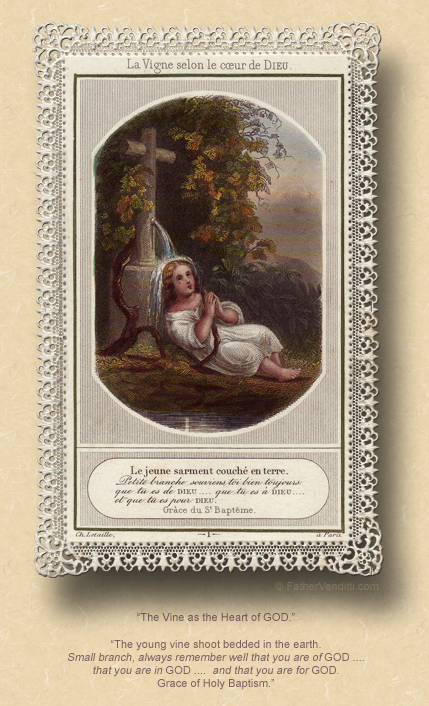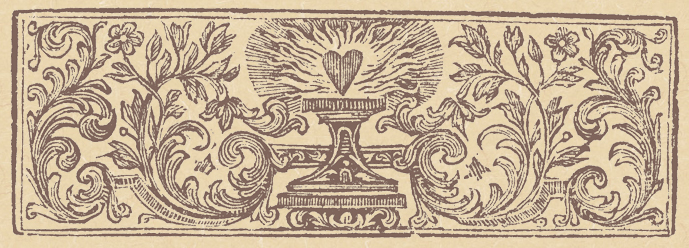Tending the Vineyard of the Soul.*
The Ninth Monday of Ordinary Time.
Lessons from the secondary feria, according to the ordinary form of the Roman Rite:
• II Peter 1: 2-7.
• Psalm 91: 1-2, 14-16.
• Mark 12: 1-12.
The Second Monday after Pentecost; and, the Commemoration of Saint Felix, Pope & Martyr.
Lessons from the dominica,** according to the extraordinary form of the Roman Rite:
• I John 3: 13-18.
• Psalm 119: 1-2.
• Luke 14: 16-24.
The Second Monday of the Apostles Fast; and, the Feast of Our Venerable Father Isaac, Hegumen of the Dalmatian Monastery.
Lessons from the pentecostarion, according to the Ruthenian recension of the Byzantine Rite:
• Romans 7: 1-13.
• Matthew 9: 36—10: 8.
FatherVenditti.com
|
 9:27 PM 5/30/2016 — Like so many of the things said by our Lord, the parable He speaks to us in this gospel lesson has more than one meaning. On the surface, our Lord has a very definite message for His listeners. He speaks of a vineyard which is leased out to others by it’s owner; He speaks of servants who are sent by the owner to collect the year’s harvest from the tenants, and how the servants are beaten and killed by the tenants who have forgotten that they don’t own the vineyard; and finally He speaks of a son who is sent and who is killed. The symbolism is almost too simple: the owner of the vineyard is, of course, God the Father, who has offered His covenant—His vineyard—to the Jewish people. And when His people go astray, He sends them His servants, the prophets of the Old Testament, to remind them that they are not the owners, that they owe an accounting of their lives to God. But the servants—the prophets—are ignored, and some are killed, as we know frequently happened in the Old Testament. And in a final act of compassion and fatherly concern, the vineyard owner, God, sends His own Son, at which point we realize our Lord is speaking about Himself. Isn’t it interesting that when our Lord speaks in the parable of how the son of the owner is killed because of the tenant’s greed, He is predicting His own death at the hands of His own people? 9:27 PM 5/30/2016 — Like so many of the things said by our Lord, the parable He speaks to us in this gospel lesson has more than one meaning. On the surface, our Lord has a very definite message for His listeners. He speaks of a vineyard which is leased out to others by it’s owner; He speaks of servants who are sent by the owner to collect the year’s harvest from the tenants, and how the servants are beaten and killed by the tenants who have forgotten that they don’t own the vineyard; and finally He speaks of a son who is sent and who is killed. The symbolism is almost too simple: the owner of the vineyard is, of course, God the Father, who has offered His covenant—His vineyard—to the Jewish people. And when His people go astray, He sends them His servants, the prophets of the Old Testament, to remind them that they are not the owners, that they owe an accounting of their lives to God. But the servants—the prophets—are ignored, and some are killed, as we know frequently happened in the Old Testament. And in a final act of compassion and fatherly concern, the vineyard owner, God, sends His own Son, at which point we realize our Lord is speaking about Himself. Isn’t it interesting that when our Lord speaks in the parable of how the son of the owner is killed because of the tenant’s greed, He is predicting His own death at the hands of His own people?
The Pharisees and the Hebrew priests who were present in the Temple that day were not stupid. They knew our Lord was speaking about them; Saint Mark tells us as much in the last verse. But what he does not tell us—what he cannot tell us—is what our Lord may be trying to say to us. Everything said by our Lord has a double meaning; and, while the parable of the vineyard may be, to our Lord’s historical audience, an allegory about the history of the Jewish people and the role of Christ in salvation, it also must teach us something about ourselves, and something more than just a historical lesson.
For the Lord has also entrusted to us a vineyard. He has given us new life through baptism. He has given us the Church and the sacraments as fountains of grace and life. He has given us the Gospel as a path to heaven. He has placed in our own hands the possibility of salvation and eternal life. He has sent us teachers to correct our faults, not only the prophets of old, but also the Fathers of the Church, the saints, the martyrs, the popes. Sometimes we listen, sometimes we don’t. And the day will come when He will ask for an account of how well we have harvested the seeds that He has planted. And if there is no fruit, that will not be His fault, but ours; for just as the vineyard owner sent his son to collect the harvest, just as the Father sent Christ our God to collect the harvest of the covenant from the Jewish people, so again the Father will send the Son as King and Judge of the world. And He will ask us to show him the lives of purity and virtue and holiness that we have reaped from the seeds of grace He has planted in us.
In the Holy Sacrifice of the Mass we are thrust into the very presence of God. In receiving Holy Communion we are given more grace than was ever given to the prophets of old. But it is not magic. Even the act of being in the very presence of Christ our God in the Eucharist, even the act of taking Him into our souls in Holy Communion, does not compel us to do good against our will. We have to make a decision that, after we have received our Lord and go forth from this Church back out into the world, that we will live as if Christ lives in us. We have to decide whether, when others see us act or hear us speak, they will be able to see Christ in us. And if, when they see us, they see nothing different than they saw before, then what was the point?
Christ, once again, will plant the seed of His grace into our souls today when we receive Him in Holy Communion. Let us not allow that seed to wither and die in a parched, arid land. Let us water it with virtue, tend it with prayer, prune it with sacrifice and mortification, so that when the vineyard Owner comes, we can return to Him a rich harvest.

* This homily was not preached at the Shrine, as our usual schedule was displaced by our annual Portuguese Day. It is offered solely for the benefit of visitors to this web site.
** In the extraordinary from, on the ferial days outside of privileged seasons, the lessons are repeated from the previous Sunday.
|

